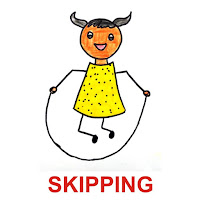MOTOR DEVELOPMENT IN EARLY CHILDHOOD
(6-11) YEARS OF AGE
6-11 years old coming out of their
classes after school is over? Yes you are Right! Some of them would be running,
others would be skipping and still others leaping on to narrow edges and
balancing themselves. The children are learning to coordinator their muscle for
different types of movements. The body had two types of muscles, namely the
large muscles such as those of legs, arms, back etc. and the small muscles or
fine muscles such as those in the fingers, toes etc.
Muscle
coordination is of two types: (Fine
or Gross)
The movements of fine (small) muscles is
called fine motor muscular coordinator
while the movement of large muscle is called gross motor muscular coordinator. Activities such as running,
balancing, skipping, climbing etc.
Gross
muscular coordination
Motor skill are action that involves that
the movement of muscles in the body. They are divided into two groups. Gross
motor skills develop over a relatively short period of time. Most development
occurs during childhood. E.g. crawling, running, jumping.
Fine
motor skills
AS the child grow older greater
proficiency over fine movement is gained. This is the period which involves
fine motor coordination can be taught to the child such as writing, needle
work, painting etc. It is known from experience that children learn to walk
run, jump, kick etc. before they learn to feed themselves or write.
It means that gross motor muscular
coordination is learnt before fine muscle coordination. From 6-11 years, the
handwriting gradually improves i.e. it becomes better and faster. Children in
the age group between 6-11 years learn maximum number of different activities.
They play different types of games.
Activities
and skills from 6-11 years
·
Throw
a ball at an estimated distance.
·
Catch
the ball
·
Balance
on one feet
·
Jump
at a good height
·
Skip
with two legs
DISORDER OF PHYSICAL
DEVELOPMENT DURING
(6-11) YEARS OF AGE
Some of the disorders that arise in
children could be due to physical illness, fall, injuries and accidents etc.
Some of the disorders are Genetic, while some are acquired. Did this order that
are obtained during this period are given below: (ADD) Attention Deficit
Disorder.
·
Hyperactive
o
Children
with this disorder are distractible, impulsive, irritable, moody, slow in
learning and in attentive, physically such as children tend to move from one
side to another and are constantly diverted by sounds and objects. They are chaotic
in their behaviour and tends to forget what they are told to do, cannot do sequentially
ordered tasks.
·
Hypoactive
o
Children
with disorder show less than normal activity levels and excessive day learning.
They may be quite and understanding in their behaviour but may not be able to
attend to specific tasks.
·
Execution of motor skills
o
Children
at this age show wide range of individual differences in the execution of motor
skills and in their ability to masters, complex motor tasks. They show
improvement in gross motor skills reflected in increased speed, power,
coordination, agility and balance. These children appear to be always in a
hurry. They also show intense interest in acquiring and improving these skills.
o
As
for disorder in regards to these aspects they may have certain congenital or
acquired deficits in motor skills and activities. Many may not be able to show coordination
or fine motor skills due to deficiency or abnormality in their physique. Sometimes
high fever and many physical illness may keep the children of from many of
these activities and when they do recover, they may not be able to equal their
peers and thus feel unhappy.
·
Fail
to close attention to details leading to careless mistakes
·
Avoiding
task that require strenuous activity
·
Having
difficulty in organizing task
·
Easily
destructed by extraneous activity
·
Fidgets
and squirms in seat
·
Forgetting
schedule for daily activities
·
Loosing
material that is necessary for the task they need to complete
·
Having
difficulty in listening and what is being said
·
Having
difficulty sustaining attention to task or to play activities
·
Leave
desk or seat in the classroom inappropriate time
·
Talk
excessively
·
Run
or climb in situation when it is inappropriate
·
Avoid
engaging in quite leisure activities
·
Displays
difficulty waiting in lines and taking turn
Interrupting into
conversation or other peoples gain and intruding on others











